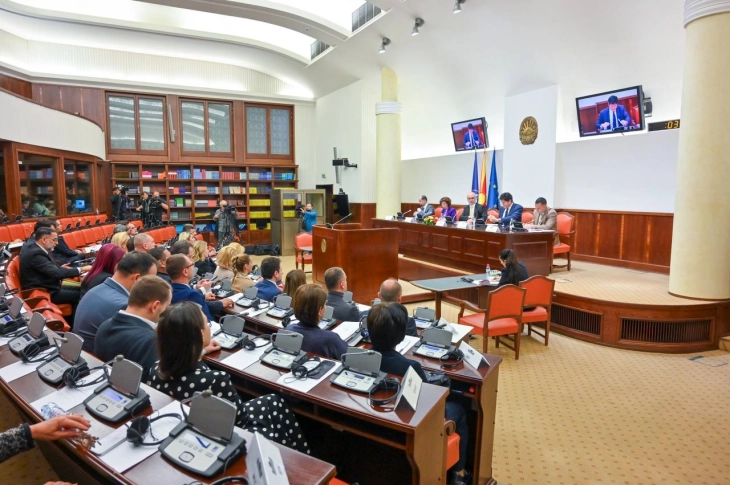Rokas: Growth Plan clear proof of EU’s commitment to Western Balkan partners
- The Growth Plan is clear proof of the European Union’s commitment to our Western Balkan partners that there is a credible path to accession to the Union. This is a path that offers benefits before the accession itself, but which also contributes to the acceleration of the accession process, provided the fundamental reforms are implemented. It is important to stress that the Growth Plan is not an alternative to EU enlargement, it is an option that will supplement and accelerate the enlargement process, EU Ambassador Michalis Rokas said at Friday’s presentation of the Government’s 2024-2027 Reform Agenda at a session of Parliament’s Committee on European Affairs.
- Post By Angel Dimoski
- 18:36, 8 November, 2024

Skopje, 8 November 2024 (MIA) - The Growth Plan is clear proof of the European Union’s commitment to our Western Balkan partners that there is a credible path to accession to the Union. This is a path that offers benefits before the accession itself, but which also contributes to the acceleration of the accession process, provided the fundamental reforms are implemented. It is important to stress that the Growth Plan is not an alternative to EU enlargement, it is an option that will supplement and accelerate the enlargement process, EU Ambassador Michalis Rokas said at Friday’s presentation of the Government’s 2024-2027 Reform Agenda at a session of Parliament’s Committee on European Affairs.
At the session, the Ambassador said the Reform and Growth Facility is an essential part of the Growth Plan and also supplements the Instrument for Pre-accession Assistance (IPA) and the other mechanisms.
“The reform agenda presented by the Ministry of European Affairs reflects the most important priorities for which North Macedonia received an indicative distribution of EUR 750 million. The European Commission has already accepted the reform agenda, which has a high level of ambition... The provision of these funds will be conditioned by the successful implementation of the reform agendas of our Western Balkan partners, also covering the reforms in the area Fundamentals and socio-economic reforms in close cooperation with the EC. Parliament has a really important role to play in this process,” Rokas said.

The Ambassador said the challenges ahead are related to the establishment of national structures for the implementation, monitoring and reporting, stressing that achieving the appropriate results will be essential.
Minister of European Affairs Orhan Murtezani said the reforms aim to accelerate the integration process and advance the country’s economy, judiciary, public administration, and strengthen the rights of the citizens, especially in terms of rule of law and the fight against corruption.

“The implementation of this agenda will be carefully monitored, and a national structure monitoring the reporting, assessment and revision mechanisms will be established in line with the requirements laid out in the Regulation on the Reform and Growth Facility. The commitment of the Government and the Ministry of European Affairs to efficient monitoring and accountability will create the conditions necessary for achieving the ambitious goals,” Murtezani said.
Murtezani voiced his belief that the implementation of the Reform Agenda, as well as the harmonization of the country’s legal and institutional system with that of the EU, will ensure the necessary foundations for an accelerated integration into the European Union.
“The implementation of these reforms will require collective effort, not only from the Government and Parliament, but also from civil society, the private sector and the broader public,” Minister Murtezani said.

The session was also addressed by President Gordana Siljanovska-Davkova who welcomed the Growth Plan and voiced optimism that the Reform Agenda is achievable.
“I think it’s worth to be optimistic. You know I’ve criticized the EU often for lacking a real strategy for the Western Balkans after Thessaloniki, for being late, for failing to take responsibility at times, but I think this is a step forward. We have an agenda, we say its implementation is not impossible, they understand us and support us,” Siljanovska-Davkova said.
The President said the most important aspect is the capacity of the 20 institutions involved in the implementation of the reforms, as well as the capacity of the Ministry of European Affairs and the Ministry of Finance.
“In my opinion, internal control is very important on one hand, and on the other hand, perhaps the most important is the control by the auditors. We rightly have a positive opinion of the State Audit Office, but now it will receive additional competencies. I believe these are key measures that we need to concentrate on,” Siljanovska-Davkova said.

The Deputy Speaker of Parliament, Antonio Miloshoski, who chaired the session, underscored the fact the Reform and Growth Facility cannot be blocked by any member state due to certain political misunderstandings or irrational disputes. “The realization of the EC’s Growth Plan depends entirely on the country’s capacity to implement as many reforms as possible in these six areas,” he said.
The Reform Agenda was drafted in close cooperation with the European Commission and will cover priority areas such as public administration reform, energy transition, cybersecurity, digitization, development of human capital and improvement of the corporate landscape.
Photo: MIA/Ministry of European Affairs







